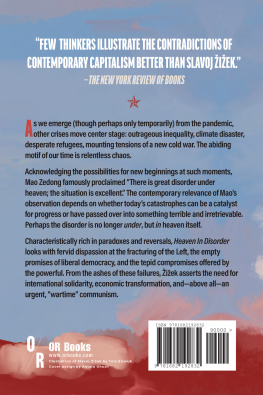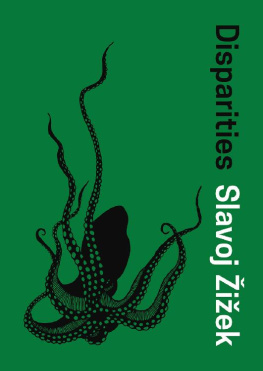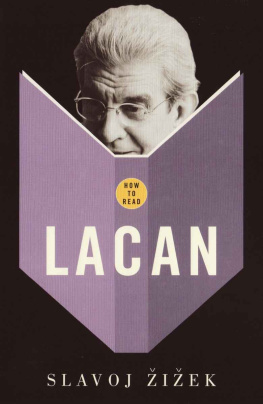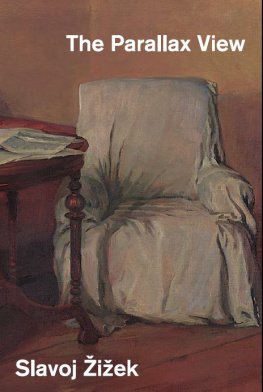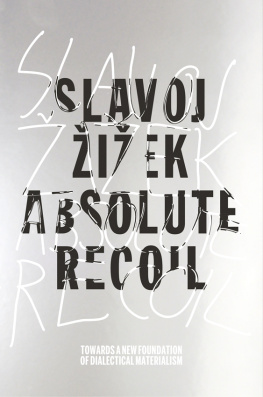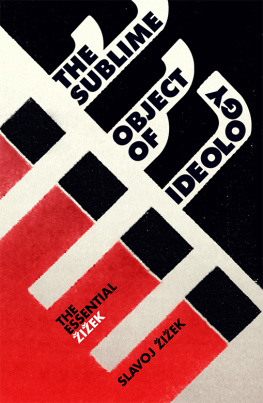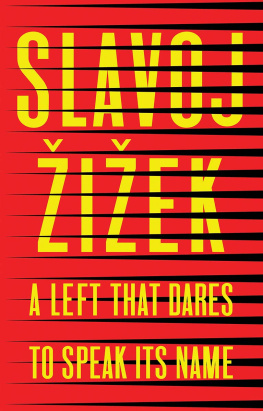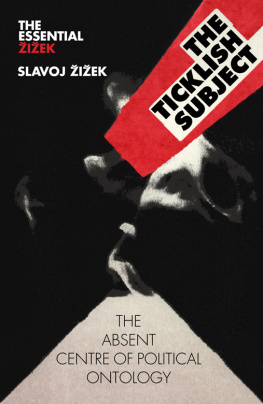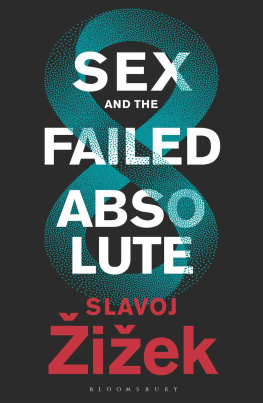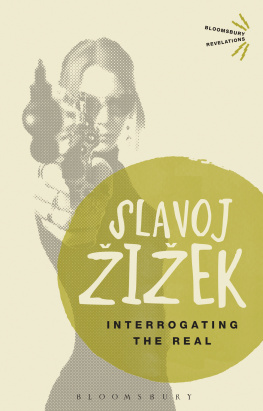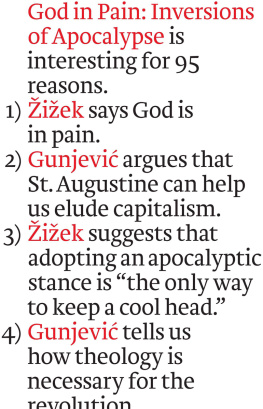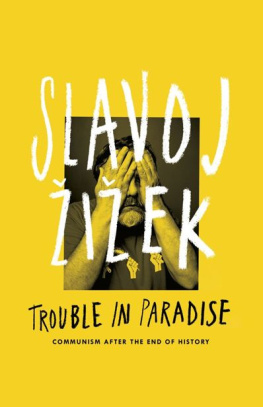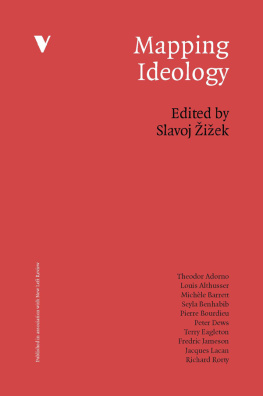Slavoj Žižek - Heaven in Disorder
Here you can read online Slavoj Žižek - Heaven in Disorder full text of the book (entire story) in english for free. Download pdf and epub, get meaning, cover and reviews about this ebook. year: 2021, publisher: OR Books, genre: Politics. Description of the work, (preface) as well as reviews are available. Best literature library LitArk.com created for fans of good reading and offers a wide selection of genres:
Romance novel
Science fiction
Adventure
Detective
Science
History
Home and family
Prose
Art
Politics
Computer
Non-fiction
Religion
Business
Children
Humor
Choose a favorite category and find really read worthwhile books. Enjoy immersion in the world of imagination, feel the emotions of the characters or learn something new for yourself, make an fascinating discovery.
- Book:Heaven in Disorder
- Author:
- Publisher:OR Books
- Genre:
- Year:2021
- Rating:5 / 5
- Favourites:Add to favourites
- Your mark:
- 100
- 1
- 2
- 3
- 4
- 5
Heaven in Disorder: summary, description and annotation
We offer to read an annotation, description, summary or preface (depends on what the author of the book "Heaven in Disorder" wrote himself). If you haven't found the necessary information about the book — write in the comments, we will try to find it.
Heaven in Disorder — read online for free the complete book (whole text) full work
Below is the text of the book, divided by pages. System saving the place of the last page read, allows you to conveniently read the book "Heaven in Disorder" online for free, without having to search again every time where you left off. Put a bookmark, and you can go to the page where you finished reading at any time.
Font size:
Interval:
Bookmark:


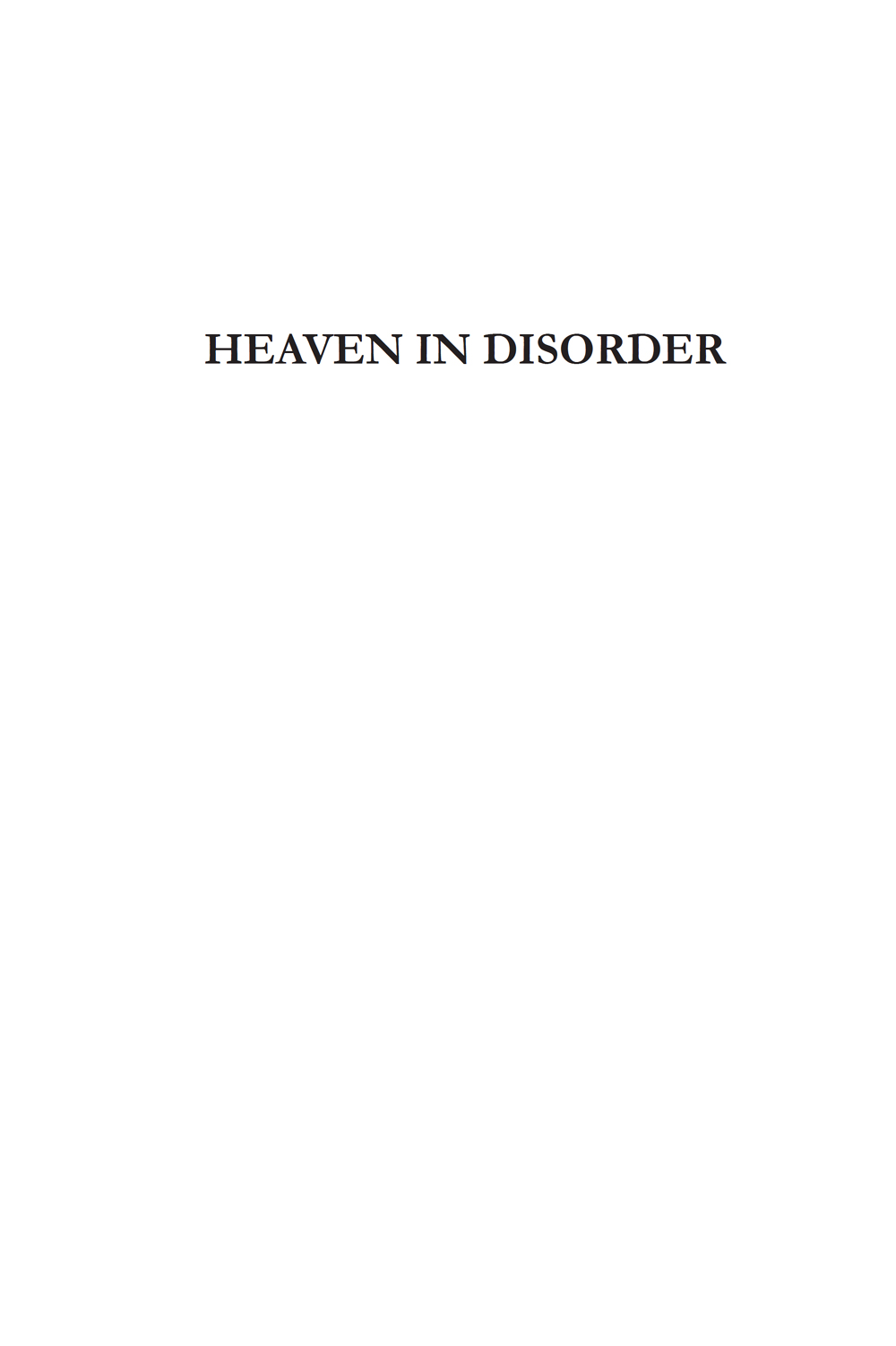

All rights information:
Visit our website at www.orbooks.com
First printing 2021
Published by OR Books, New York and London
2021 Slavoj iek
All rights reserved. No part of this book may be reproduced or transmitted in any form or by any means, electronic or mechanical, including photocopy, recording, or any information storage retrieval system, without permission in writing from the publisher, except brief passages for review purposes.
Library of Congress Cataloging-in-Publication Data: A catalog record for this book is available from the Library of Congress.
Typeset by Lapiz Digital Services. Printed by Bookmobile, USA, and CPI, UK.
paperback ISBN 978-1-68219-283-2 ebook ISBN 978-1-68219-280-1
CONTENTS
INTRODUCTION:IS THE SITUATION STILL EXCELLENT?
One of Mao Zedongs best-known sayings is: There is great disorder under heaven; the situation is excellent. It is easy to understand what Mao meant here: when the existing social order is disintegrating, the ensuing chaos offers revolutionary forces a great chance to act decisively and take political power. Today, there certainly is great disorder under heaven, with the Covid-19 pandemic, global warming, signs of a new Cold War, and the eruption of popular protests and social antagonisms worldwide naming but a few of the crises that beset us. But does this chaos still make the situation excellent, or is the danger of self-destruction too high? The difference between the situation that Mao had in mind and our own situation can be best rendered by a tiny terminological distinction. Mao speaks about disorder under heaven, wherein heaven, or the big Other in whatever formthe inexorable logic of historical processes, the laws of social developmentstill exists and discreetly regulates social chaos. Today, we should talk about heaven itself as being in disorder. What do I mean by this?
In Divided Heaven (1963), Christa Wolfs classic GDR novel about the subjective impact of divided Germany, Manfred (who has chosen the West) says to his love, Rita, when they meet for the last time: But even if our land is divided, we still share the same heaven. Rita (who has chosen to remain in the East) bitterly replies: No, they first divided the heaven. Apologetic (of the East) as the novel is, it offers the right insight into how our earthly divisions and fights are ultimately always grounded in a divided heaven; that is, in a much more radical and exclusive division of the very (symbolic) universe in which we dwell. The bearer and instrument of this division of heaven is language as the medium that sustains the way we experience realitylanguage, not primitive egotistic interests, is the first and greatest divider. It is because of language that we (can) live in different worlds to our neighbors, even when they live on the same street.
Today, the situation is not one in which heaven is divided into two spheres, as was the case in the Cold War period when two global worldviews confronted each other. The divisions of heaven today appear increasingly drawn within each particular country. In the United States, for instance, there is an ideological and political civil war between the alt-Right and the liberal-democratic establishment, while in the United Kingdom there are similarly deep divisions, as were recently expressed in the opposition between Brexiteers and anti-Brexiteers... Spaces for common ground are ever diminishing, mirroring the ongoing enclosure of physical public space, and this is happening at a time when multiple intersecting crises mean that global solidarity and international cooperation are more needed than ever.
In recent months, the often alarming ways in which the crisis of the Covid-19 pandemic is intertwined with ongoing social, political, ecological, and economic crises are increasingly apparent. The pandemic must be treated together with global warming, erupting class antagonisms, patriarchy and misogyny, and the many other ongoing crises that resonate with it, and with each other, in a complex interplay. This interplay is uncontrollable and full of dangers, and we cannot count on any guarantee in heaven to make the solution clearly imaginable. Such a risky situation makes our moment an eminently political one: the situation is decidedly not excellent, and thats why one has to act.
What, then, is to be done? Lenins demand for a concrete analysis of the concrete situation is today more actual than ever. No simple universal formula can provide the answerthere are moments in which pragmatic support for modest progressive measures is needed; there are moments when a radical confrontation is the only way; and there are moments when a sobering silence (and a cute pair of mittens) speak more than a thousand words.
WAS THE DRONE ATTACK ON SAUDI ARABIA REALLY A GAME CHANGER?
When, in September of 2019, the Houthi rebels from Yemen launched a drone attack on Saudi Aramcos crude-oil processing facilities, our media repeatedly characterized this event as a game changerbut was it really? In some common sense yes, since it perturbed the global oil supply and increased the likelihood of a large armed conflict in the Middle East. However, one should be careful not to miss the cruel irony of this claim.
Houthi rebels in Yemen have been in an open war with Saudi Arabia for years, and Saudi armed forces (supplied by the United States and the United Kingdom) have practically destroyed the entire country, indiscriminately bombing civilian objects. The Saudi intervention led to one of the worst humanitarian catastrophes, with tens of thousands of children dead. But, as was the case with Libya and Syria, destroying an entire country is here obviously not a game changer but part of the normal geopolitical game.
Even if we condemn the Houthi act, should we really be surprised to see the Houthis, cornered and in a desperate situation, striking back in whatever way they can? Far from changing the game, their act is its logical culmination. To paraphrase one of Donald Trumps unspeakable vulgarities, they finally found the way to grab Saudi Arabia by its p****, where it really hurts. Or, to paraphrase the famous line from Brechts Beggars Opera, What is robbing a bank compared to founding a new bank: what is destroying a country compared to slightly disturbing the reproduction of capital?
The media attention grabbed by the game-changing Houthi attack also conveniently distracted us from other truly game-changing projects, like the Israeli plan to annex large fertile chunks of the West Bank. What this meant is that all the talk about the two-state solution was just that, empty talk meant to obfuscate the ruthless realization of a modern-day colonization project in which what awaits the West Bank Palestinians will be, in the best case scenario, a couple of tightly controlled Bantustans. One should also note that Israel is doing this with the silent connivance of Saudi Arabiaa further proof that a new axis of evil is emerging in the Middle East composed of Saudi Arabia, Israel, Egypt, and the United Arab Emirates. It is here that the rules of the game are truly changing!
And, to broaden the scope of our analysis, one should also be attentive to how the game is changing with the Hong Kong protests. A dimension that is as a rule ignored in our media is the class struggle which sustains the Hong Kong protests against Chinas efforts to constrain its autonomy. The Hong Kong protests first erupted in poor districts; the rich were prospering under Chinese control. Then a new voice was heard. On September 8, 2019, protesters marched to the US consulate in Hong Kong, with CNN reporting that One banner carried at the march read President Trump, please liberate Hong Kong in English, [while] some marchers sang the US national anthem. Thirty-year-old banker David Wong was reported as saying: We share the same US values of liberty and democracy. Every serious analysis of the Hong Kong protests has to focus on how a social protest, potentially a true game changer, was recuperated into the standard narrative of the democratic revolt against totalitarian rule.
Next pageFont size:
Interval:
Bookmark:
Similar books «Heaven in Disorder»
Look at similar books to Heaven in Disorder. We have selected literature similar in name and meaning in the hope of providing readers with more options to find new, interesting, not yet read works.
Discussion, reviews of the book Heaven in Disorder and just readers' own opinions. Leave your comments, write what you think about the work, its meaning or the main characters. Specify what exactly you liked and what you didn't like, and why you think so.

